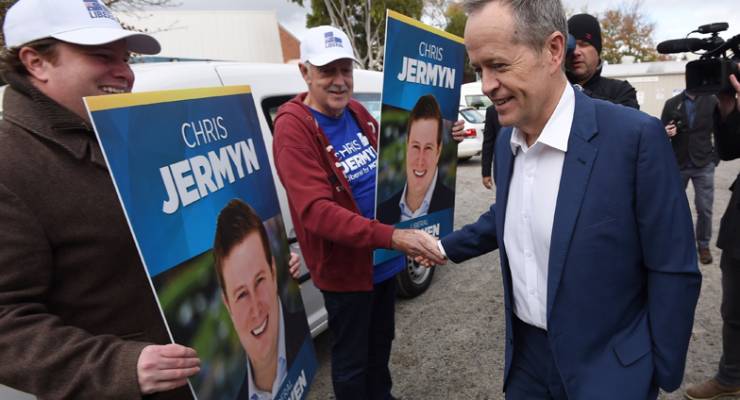
For better or for worse, one of the elements that may come to characterise the 2016 federal election is the “gotcha” moment during political interviews.
It’s not that gotcha journalism is a new phenomenon — Richard Carlton famously confounded and infuriated Bob Hawke by asking if he had “blood on his hands” after replacing Bill Hayden as Labor opposition leader in 1983.
Ten years later, Liberal opposition leader John Hewson was similarly confronted with a less obvious but apparently equally tricky question about the application of his proposed GST to a birthday cake.
Both interviews proved to be journalistic gold and have stood the test of time as significant moments in their respective election campaigns.
Other journalists have sought to replicate that success, resorting to questions about the price of petrol or a loaf of bread in the hope of “catching out” politicians with an ostensible measure of their connection with the concerns of everyday voters.
Since the advent of mobile phones, it has also become commonplace for competing political camps to text suggestions for curly questions to journalists travelling with leaders from other parties, or for journalists to ask questions about comments made elsewhere around the country that their interview subject would not have yet caught up with.
And then there is the relatively new gotcha tactic, subjecting naïve and unseasoned candidates to questions about the detail of their parties’ policies in the hope of finding one who can’t robotically recite their side’s manifesto like most serving parliamentarians can.
Liberal candidate Jaymes Diaz was the epitome of this type of hapless candidate in 2013; he stumbled badly during the campaign when asked to list the six points of the Coalition’s plan to stop asylum seeker boats.
The Liberal Party delivered again this election with candidate Chris Jermyn, who either couldn’t or wouldn’t explain the Coalition’s Medicare rebate policy after gate-crashing one of Bill Shorten’s media events.
It’s arguable whether the media’s exposure of Diaz and Jermyn as less than knowledgeable, before being elected to Parliament, actually serves the public interest. Falling victim to a gotcha interview should not mean a candidate is not capable of being an effective parliamentarian.
Senator Ricky Muir became the poster child for hapless candidates after being subjected to a car-crash interview back in 2010 (incidentally by the same journalist who asked Hewson the birthday cake question, Mike Willesee). Yet today, Muir is widely considered as one of the more thoughtful and valuable members of federal Parliament.
It could be argued that it’s another matter when an established parliamentarian falls for a gotcha question. Attorney-General George Brandis was rightfully skewered by his interrogator, Sky’s David Speers, for not being able to explain what metadata was during an interview in 2014 about, well, the government’s metadata policy.
Speers struck again in recent weeks, catching out Labor frontbencher David Feeney on the opposition’s plans to scrap the schoolkids’ bonus.
In this year’s campaign we’ve also seen government backbencher Fiona Scott caught unprepared for a question about being a traitor to former PM Tony Abbott when she appeared at a media event with Malcolm Turnbull.
And Foreign Minister Julie Bishop not only failed to explain the transition-to-retirement element of the Coalition’s superannuation policy, but attempted to minimise the damage by protesting her interlocutor’s query was a gotcha question.
It’s arguable whether the Foreign Minister should have been across the detail of every Coalition policy, and a similar excuse could be levelled for Labor’s Feeney. Scott has no such cover; she should have anticipated the ambush.
However, beyond exposing that some candidates and MPs are not infallible policy-regurgitating automatons, the public interest value of gotcha journalism remains questionable.
It’s real purpose is to add colour and movement to campaigns and interviews that have become mind-numbingly boring due to the risk-minimisation tactics of media managers (such as this writer, in a previous life).
Somewhat ironically, gotcha journalism is, in large part, responsible for politicians being drilled in the art of (not) answering the question. And also for the tightly choreographed visits to classrooms, shop floors, and shopping centres that make it almost impossible for a party leader to meet a member of the public who hasn’t already been background-checked and briefed, or utter an unscripted word.
Gotcha journalism is an attempt to break through the bubble that risk-averse campaign teams construct around their leaders, and in this respect it could be a more legitimate form of journalism.
But only if the unexpected and unsettling questions pursue and elicit information that is of greater value to the public interest than the demonstration of an interview subject’s lack of photographic memory.








Some reasonable points made in the article. No excuse or sympathy for Chris Jermyn though. If a local candidate decides to ambush a public event of an opposition leader during an election campaign, they can expect be asked a tough question or 2. He came across as a smug guy that wants the world to operate on his terms and got caught out.
Jermyn, while trying to ambush the Shorten event, was apparently outside a health centre and raising concerns about a Medicare Office. Under those circumstances, I am not convinced that a journalist asking his position on, or explanation of, the Coalition’s Medicare rebate policy is unfair at all. If he is raising the policy himself, he should be across it to a reasonable extent….
I wish that gotcha became the norm.
Jermyn is obese, ugly and an embarrassment (and I’m a Liberal). The Libs have not disendorsed him, probably because it is too late. Another seat that they have surrendered.
Can’t offer any sympathy for Jermyn, but generally the desperate search by journalists to either create a gotcha moment, or to call ‘the turning point in this election’ ranks beyond farce. I have written off a number of otherwise respectable journalists for this rubbish.